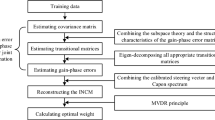Abstract
In this paper, the concept of blind algorithm with automatic gain control (AGC) is introduced in adaptive antenna system for signal optimization with an aim to estimate the desired response in adaptive fashion. Blind algorithm with AGC is a hybrid two-stage adaptive filtering algorithm; sequentially combining constant modulus algorithm (CMA) and Bessel least mean square (BLMS) algorithm. Blind Bessel beamformer with AGC does not require external reference signal to update its weight vectors and step size for convergence but updates itself from own reference signal obtained from the output of CMA. Similarly, step size is obtained from the correlation matrix which is the product of the signals induced in array elements of antenna. BLMS is the modified version of LMS algorithm; based on the non-uniform step size exploiting the asymptotic decay property of Bessel function of the first kind. The output of CMA provides input and reference signals for BLMS that makes it blind. The contributions of this paper include the development of novel blind theory concept and presentation of an AGC method in order to make the Bessel beamformer blind which can update itself electronically through the correlation matrix depending on the signal array vector with the aim to make the signal power constant.






Similar content being viewed by others
References
Gross, F. B. (2005). Smart antennas for wireless communications with MATLAB. New York: McGraw-Hill.
Dietrich C. B., Jr. (2000). Adaptive arrays and diversity antenna configurations for handheld wireless communication terminals. Ph.D. dissertation (pp. 29–52). Virginia Polytechnic Institute, State University, (Chapter 3).
Yasin, M., & Hussain, M. J. (2016). A novel adaptive algorithm addresses potential problems of blind algorithm. International Journal of Antennas and Propagation,2016, 1–8. https://doi.org/10.1155/2016/5983924.
Srar, J. A., Chung, K. S., & Mansour, A. (2010). Adaptive array beamforming using a combined LMS–LMS algorithm. IEEE Transactions on Antennas and Propagation,58(11), 3545–3557.
Srar, J. A., & Chung, K. S. (2008). Adaptive array beamforming using a combined RLS–LMS algorithm. In: The 14th Asia-Pacific conference on communications, Tokyo (pp. 1–5).
Srar, J. A., & Chung, K. S (2008). Performance of RLMS algorithm in adaptive array beamforming. In The 11th international conference on communication systems, Guangzhou (pp. 493–498).
Aounallah, N., Bouziani, M., & Taleb, A. A. (2014). A combined DMI–RLS algorithm in adaptive processing antenna system. Arabian Journal for Science and Engineering,39(10), 7109–7116.
Tariqul, I. M. Z., & Rashid, A. A. (2006). MI-NLMS adaptive beamforming algorithm for smart antenna system applications. Journal of Zhejiang University Science A,7(10), 1709–1716.
Hang, R., & de Rodrigo, C. L. (2016). Low-complexity robust adaptive beamforming algorithms exploiting shrinkage for mismatch estimation. IET Signal Processing,10(5), 429–438.
Jian, Y., Xi, Hongsheng, Feng, Y., & Yu, Z. (2006). Fast adaptive blind beamforming algorithm for antenna array in CDMA systems. IEEE Transactions on Vehicular Technology,55(2), 549–558.
Yasin, M., & Akhtar, Pervez. (2014). Mathematical model of bessel beamformer with automatic gain control for smart antenna array system. Arabian Journal for Science and Engineering,39(6), 4837–4844. https://doi.org/10.1007/s13369-014-1089-4.
Yasin, M., Akhtar, Pervez, & Pathan, Amir Hassan. (2014). Mathematical model of bessel beamformer with automatic gain control for smart antenna array system in rayleigh fading channel. IEEJ Transactions on Electrical and Electronic Engineering,9(3), 229–234.
Yasin, M., & Akhtar, Pervez. (2014). Design and performance analysis of live model of bessel beamformer for adaptive array system. COMPEL: The International Journal for Computation and Mathematics in Electrical and Electronic Engineering,33(4), 1434–1447.
Zhang, L., So, H. C., Ping, Li, & Liao, Guisheng. (2003). Effective beamformer for coherent signal reception. IEEE Electronics Letters,39(13), 949–951.
Zhang, L., So, H. C., Ping, L., & Liao, G. (2004). Adaptive multiple-beamformers for reception of coherent signals with known directions in the presence of uncorrelated interferences. Elsevier Journal Signal Processing,84(10), 1861–1873.
Widrow, B., & Stearns, S. D. (1985). Adaptive signal processing. London: Pearson Education, Inc.
Haykin, S. (2002). Adaptive filter theory (4th ed.). London: Pearson Education, Inc.
Soni, R. A., Jenkins, W. K., & Schirtzinger, T. A. (1998). Learning strategies for adaptive equalizers using the constant modulus error criterion. International Journal of Adaptive Control and Signal Processing,12, 97–116.
Author information
Authors and Affiliations
Corresponding author
Additional information
Publisher's Note
Springer Nature remains neutral with regard to jurisdictional claims in published maps and institutional affiliations.
Rights and permissions
About this article
Cite this article
Yasin, M., Khan, M.J. Development of blind algorithm with automatic gain control. Wireless Netw 26, 2413–2422 (2020). https://doi.org/10.1007/s11276-019-01972-1
Published:
Issue Date:
DOI: https://doi.org/10.1007/s11276-019-01972-1




